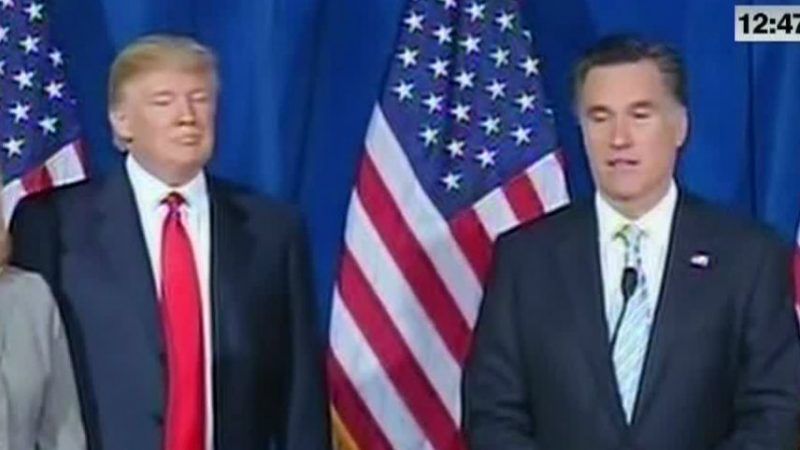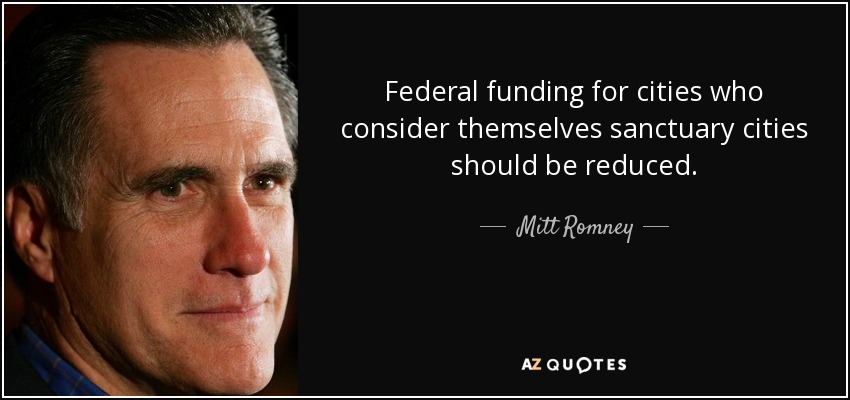Mitt Romney Is Nobody's Wise Man on Sanctuary Cities and Proto-Trumpian Immigration Politics
The #NeverTrump favorite, poised to be a Senate thorn in the president's side, has more in common with Trump's jail-'em-all ICE director than many Republicans care to admit

There were two separate stories crisscrossing my Twitter feed this morning that deserve to be knitted together. One is the news, greeted with audible sighs of relief by #NeverTrump conservatives and conflict-seeking media alike, that Mitt Romney stands at the ready to occupy the Utah Senate seat being vacated by the retiring Orrin Hatch. The second is this Neil Cavuto interview Tuesday with acting director of Immigrations and Customs Enforcement (ICE) Thomas Homan, who asserted that the Department of Justice should "file charges against the sanctuary cities" and "start charging some of these politicians with crimes." Take a look:
Besides exhibiting the kind of casual authoritarianism more commonly found in second-world autocracies, Homan's comments represent a fundamental hostility toward the Constitution's separation of powers. As Damon Root wrote in November, on the occasion of a District Court declaring unconstitutional the Trump administration's attempt to withhold federal funding from sanctuary cities,
Sanctuary cities are protected by both the Constitution and Supreme Court precedent. For starters, as the late Justice Antonin Scalia explained in Printz v. United States (1997), "the Federal Government may neither issue directives requiring the States to address particular problems, nor command the States' officers, or those of their political subdivisions, to administer or enforce a federal regulatory program." Put simply, Trump's executive order flunks the 10th Amendment test that Scalia spelled out in Printz.
Trump's executive order also flunks the test set forth by the Supreme Court in National Federation of Independent Business v. Sebelius (2012), which held that the federal government may not threaten to withhold existing funding from a state in an attempt to coerce that state into doing the feds' bidding. Such an effort would be an unconstitutional act of "economic dragooning."
Having the feds drag Jerry Brown away in shackles may be an interesting visual, but it would not survive the judicial laugh test.
So what does this have to do with poor Mitt Romney? Only this: In 2008 and 2012, Romney wielded the sanctuary cities issue like a hammer against his Republican presidential opponents.

As I wrote before the 2016 election,
In August 2007, when [Rudy] Giuliani was in the middle of a year-long, mostly uncontested stint at the top of Republican presidential primary polls, Mitt Romney, then in fourth place, started attacking him. "If you look at lists compiled on websites of sanctuary cities, New York is at the top of the list when Mayor Giuliani was mayor," the former Massachusetts governor said at the time. "He instructed city workers not to provide information to the federal government that would allow them to enforce the law."
Romney kept hammering away at the sanctuary charge throughout that fall. By the end of 2007, Romney had caught up to Giuliani-who would exit the race the following month—and was setting his sights on emerging front-runner Sen. John McCain (R–Ariz.). "McCain pushed to let every illegal immigrant stay here permanently," a December Romney ad charged, with questionable accuracy. "Even voted to allow illegals to collect Social Security." […]
Four years later, Romney, who as governor in 2005-2006 endorsed the comprehensive reform packages championed by McCain and then-President Bush, was determined to wage the 2012 primary as the biggest immigration hawk in the field. When Texas Gov. Rick Perry opened up a polling lead in the summer of 2011, Romney repeatedly hammered him for creating a "magnet for illegal immigration" by allowing in-state tuition for illegals at Texas universities. With Perry thus dispatched, Romney out-hawked Newt Gingrich by calling for policies that would lead people to "self-deport."
And lest we forget, weeks after that election, a prominent businessman and political observer blamed such immigration hawkery for Romney's defeat. "He had a crazy policy of self deportation which was maniacal….It sounded as bad as it was, and he lost all of the Latino vote….He lost the Asian vote. He lost everybody who is inspired to come into this country." Eventually, though, Donald Trump would change his mind.
Denying federal funding to sanctuary cities is right there in Mitt Romney's 2012 Republican Platform, as it had been four years before. As with so many other policies, Trump on immigration is actually calling Republicans' bluff, rather than being content to demagogue the issue on the campaign trail and then drop it like a hot tamale once in office. Trump may have provided an accelerant, but the arc of the GOP's devolution on immigration long predates him mattering, and still bends through the pages of even the most Trump-skeptical conservative publications.
The federal government should not jail state and local officials who conclude, as then-New York Mayor Rudy Giuliani did while overseeing a historic crime drop in the mid-1990s, that when it comes to residents interacting with government, you need to "protect undocumented immigrants…from being reported to the [feds] while they are using city services that are critical for their health and safety, and for the health and safety of the entire city." It is not the job of local cops to enforce federal law. While Trumpian conservatives are the ones who need this constitutional refresher most urgently in 2018, it was their Romney-world predecessors who led us down this authoritarian path.


Show Comments (60)